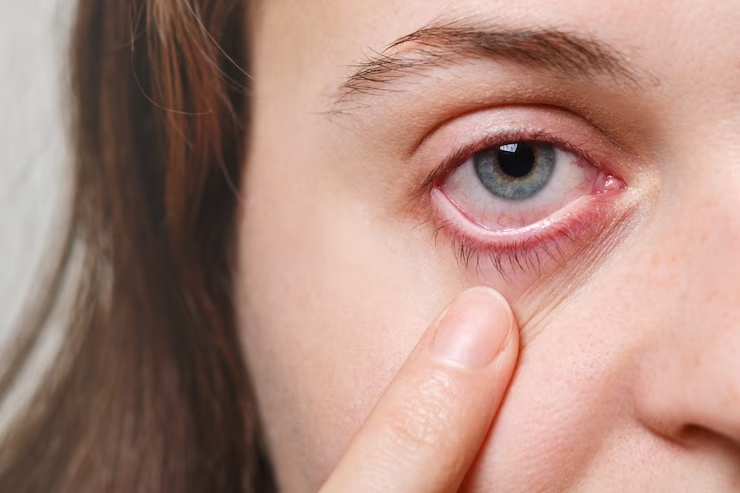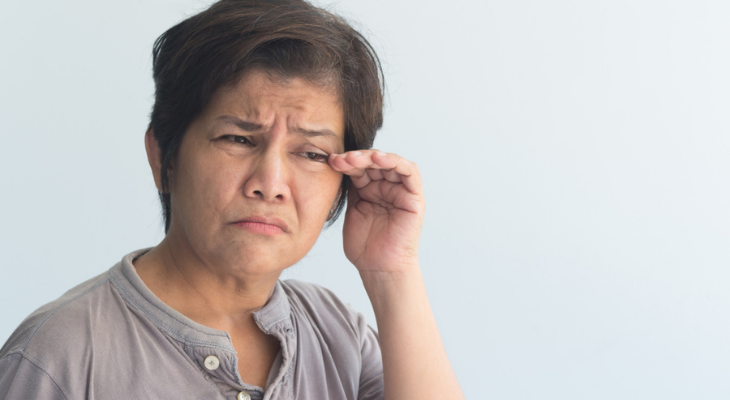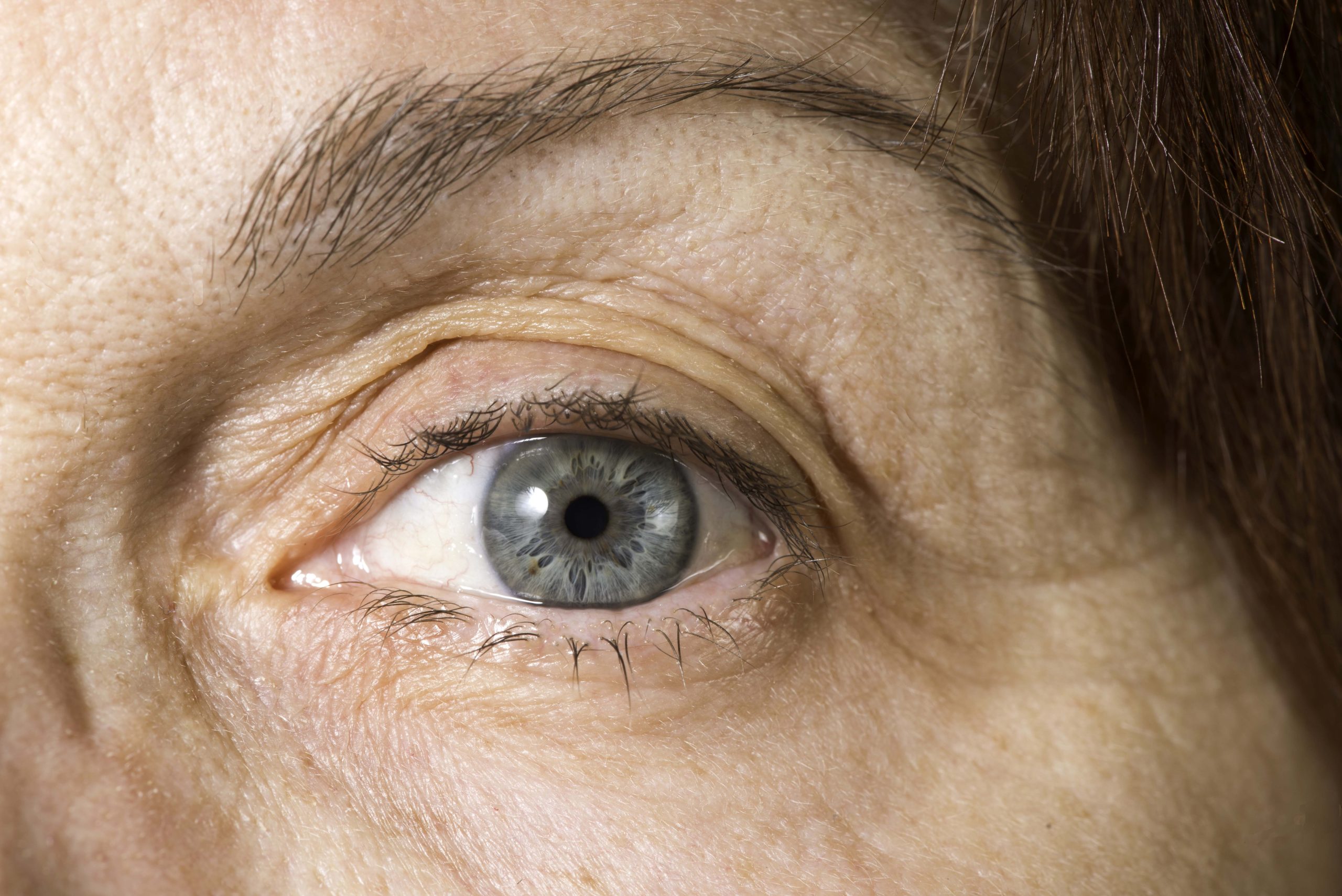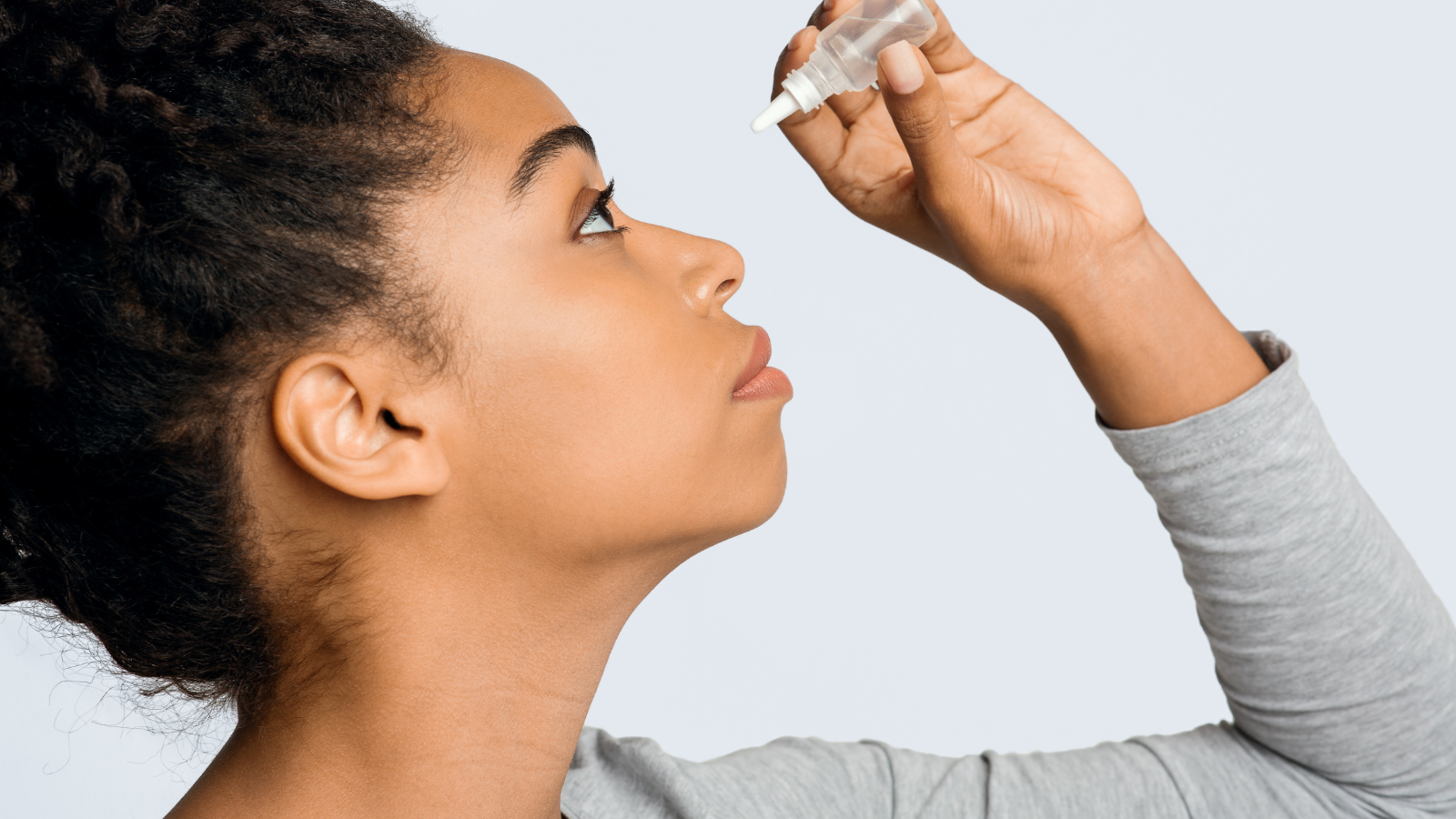Menopause is often associated with a variety of physical symptoms due to hormonal changes, and one lesser-known but common issue is dry eyes. This condition, primarily caused by decreases in estrogen and androgen levels, affects the tear film that keeps the eyes moist. In this guide, we will find out how menopause contributes to dry eyes, the symptoms to watch for, and effective management strategies to alleviate discomfort and maintain eye health during this transitional phase in a woman’s life.

Contents
- 1 Does Menopause Cause Dry Eyes?
- 2 Recognizing Dry Eye Symptoms
- 3 Does Dry Eye Disease Improve After Menopause?
- 4 Can You Prevent & Manage Dry Eyes During or After Menopause?
- 5 Frequently Asked Questions
- 5.1 How can Dry Eye Syndrome be managed during menopause?
- 5.2 What are the typical symptoms of menopause-induced dry eyes?
- 5.3 What dietary supplements could alleviate severe dry eyes?
- 5.4 Which foods are beneficial for individuals suffering from dry eyes?
- 5.5 Is there a correlation between dry eyes and reduced estrogen levels?
Does Menopause Cause Dry Eyes?
Yes, menopause can cause dry eyes. In fact, it’s a fairly common symptom, affecting around 61% of perimenopausal and menopausal women. There are a few reasons why this happens:
-
Hormonal Changes: During menopause, your body produces less estrogen, progesterone, and androgens. These hormones play a role in tear production and the quality of the tears. The decrease in estrogen and androgens specifically can affect the oil glands in your eyelids, which are necessary for keeping your tears from evaporating too quickly.
-
Tear Production: Due to the hormonal changes, your body might not produce enough tears to keep your eyes lubricated. This can lead to dryness, irritation, and a gritty feeling.
-
Tear Quality: Even if you produce enough tears, their quality might be compromised. The tears may not have the right balance of water, oil, and mucus to properly lubricate your eyes.
Recognizing Dry Eye Symptoms
Given that distinguishing dry eye symptoms forms a crucial part of effective management, ensuring that you’re well-informed about these signs is paramount. Dry eye syndrome typically ushers in changes to your tears’ structure and cornea surface lesions. Such disruptions can then lead to a series of identifiable symptoms.

Notably, you might experience:
- Visual discomfort, where your eyes fail to adapt to different lighting conditions.
- Visual disturbances, such as blurriness or foggy vision.
- Pain in the eyes that persists over time.
- Burning sensations that aren’t necessarily tied to external factors.
- Itchiness that resists usual remedies.
- Redness that maintains even after adequate sleep.
- Fatigue in the eyes is seemingly inexplicable.
- The dryness remains despite tear production.
- Enhanced sensitivity to light, whereby brightness seems intolerable.
Does Dry Eye Disease Improve After Menopause?
Research on dry eye improvement after menopause is inconclusive. Here’s a breakdown of what we know:

Worsening During Menopause: Dry eye symptoms tend to worsen during perimenopause and menopause due to hormonal changes, particularly the decrease in estrogen and androgens.
Limited Improvement After Menopause: Studies haven’t shown a definitive improvement in dry eye disease after menopause. While some women might experience some relief, others may continue to experience dryness.
Factors Affecting Improvement: Several factors can influence whether dry eye symptoms improve after menopause:
- Individual Hormonal Levels: Some women may have a more significant drop in hormones than others, leading to varying degrees of dryness.
- Overall Eye Health: Underlying eye conditions or tear gland dysfunction can make dry eye more persistent.
- Treatment During Menopause: Using lubricants or medication during menopause might help manage symptoms and potentially improve long-term outcomes.
Can You Prevent & Manage Dry Eyes During or After Menopause?
Yes, dry eyes associated with menopause can be effectively prevented and managed with several strategies. Here’s how you can prevent and manage dry eyes during or after menopause:

1. Artificial Tears and Eye Drops
Using over-the-counter artificial tears can provide immediate relief by lubricating the eyes. There are also prescription eye drops available that can help increase tear production or reduce inflammation.
2. Increase Indoor Humidity
Dry indoor environments can exacerbate dry eye symptoms. Using a humidifier to add moisture to the air in your home or office can help maintain eye moisture.
3. Stay Hydrated
Increasing your water intake helps hydrate the body, including the eyes. Aim for 8-10 glasses of water a day to help keep your body and tear film hydrated.
4. Omega-3 Fatty Acid Supplements
Omega-3 fatty acids are known to support eye health, particularly the function of the meibomian glands, which secrete oils that prevent the evaporation of tears. Foods rich in omega-3s include fish like salmon and sardines, flaxseeds, and walnuts, or you can take fish oil or flaxseed oil supplements.
5. Protective Eyewear
Wearing sunglasses outdoors can protect your eyes from wind and UV rays, which can dry out the eyes. Indoors, consider wearing glasses that block out blue light from screens, which can help reduce eye strain.
6. Manage Screen Time
Prolonged use of computers and smartphones can lead to reduced blinking, which can exacerbate dry eyes. Practice the 20-20-20 rule: every 20 minutes, look at something 20 feet away for at least 20 seconds to reduce eye strain and help keep your eyes moist.
7. Eye-friendly Environment
Avoid direct airflow from fans, heaters, and air conditioners towards your face. This can help reduce the drying effect on your eyes.
8. Regular Eye Exams
Visit an eye care professional regularly, especially if you notice persistent symptoms of dry eyes. They can provide specific recommendations and treatments, such as punctal plugs that block tear drainage and keep the eyes moist.
9. Prescription Medications
If over-the-counter solutions are insufficient, your doctor may prescribe medications that help increase tear production or recommend corticosteroid drops to reduce inflammation.
10. Blink Exercises
Regularly practicing blinking exercises can improve blink efficiency and increase tear film stability. One simple exercise is to consciously close your eyes, pause, then open them and repeat several times throughout the day.
Frequently Asked Questions
How can Dry Eye Syndrome be managed during menopause?
Treatment primarily involves lubricating eye drops, available at most pharmacies. If unsuccessful, doctors may suggest scleral contact lenses to safeguard the cornea.
What are the typical symptoms of menopause-induced dry eyes?
Post-menopausal women may report persistent dry, scratchy eyes, light sensitivity, blurry vision, increased tearing, or inflamed, reddened eyelids — collectively known as Chronic Dry Eye Syndrome.
What dietary supplements could alleviate severe dry eyes?
Incorporating omega-3 fatty acids, and vitamins D, A, and C into your diet or as supplements can significantly aid in mitigating dry eye symptoms.
Which foods are beneficial for individuals suffering from dry eyes?
Diverse fruits, vegetables, dairy products and more can alleviate dry eyes. These include avocados, bell peppers, broccoli, oranges, eggs, cheese, salmon, lean beef and brown rice. A nutritious diet is a key factor in maintaining vibrant eye health.
Is there a correlation between dry eyes and reduced estrogen levels?
Dry eyes are a lesser-known symptom of menopause, potentially caused by decreased estrogen. Now, researchers are examining the potential influence of androgens. The human tear film, which lubricates the eyes, is a blend of water, oil, and mucus.
I am a medical student with experience and interest in Women’s health and well-being.